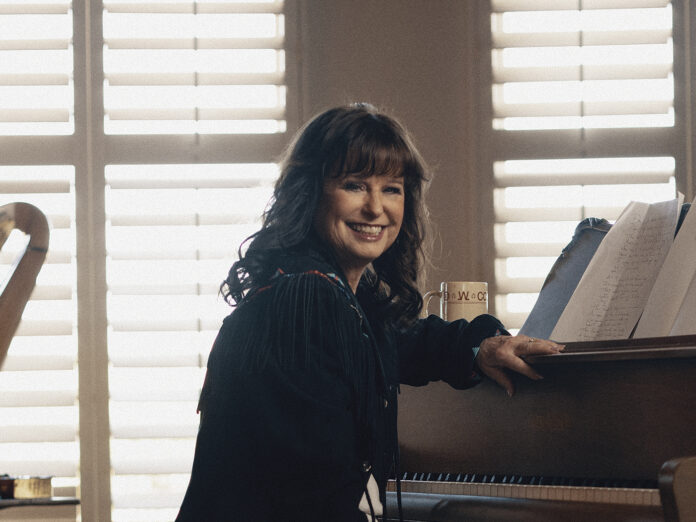Fifty three years ago Jessi Colter released a solo debut titled A Country Star Is Born. She had already made a limited impression as Miriam Eddy, performing throughout the 1960s with her first husband Duane Eddy and writing songs for Don Gibson and Nancy Sinatra among others. But renaming herself after a male ancestor who rode with Jesse James, her first solo album represented a breakout and its title was prescient – a few months later she was nominated for a Grammy as best country performance by a duo or group with her second husband Waylon Jennings for their version of “Suspicious Minds”.
Fifty three years ago Jessi Colter released a solo debut titled A Country Star Is Born. She had already made a limited impression as Miriam Eddy, performing throughout the 1960s with her first husband Duane Eddy and writing songs for Don Gibson and Nancy Sinatra among others. But renaming herself after a male ancestor who rode with Jesse James, her first solo album represented a breakout and its title was prescient – a few months later she was nominated for a Grammy as best country performance by a duo or group with her second husband Waylon Jennings for their version of “Suspicious Minds”.
KEITH RICHARDS IS ON THE COVER OF THE NEW UNCUT – HAVE A COPY SENT STRAIGHT TO YOUR HOME
Together with Waylon, Willie Nelson and Tompall Glasser, she went on to appear on the seminal 1976 compilation Wanted: The Outlaws and became a lynchpin in the insurgent challenge to Nashville’s mainstream that came to be known as ‘outlaw country’. The movement inspired such mavericks as Steve Earle and Lucinda Williams and then led to the alt.country breakout of the 1990s, spearheaded by Uncle Tupelo, Wilco, Whiskeytown and the rest.
Produced by Margo Price, there is an obvious parallel between the 80-year-old Colter’s late flowering on The Edge Of Forever and the way Jack White took the 72-year-old Loretta Lynn to a new audience by producing 2004’s Van Lear Rose. Indeed, there’s a further connection, for it was White who put Price on the road to stardom when he released her debut Mid-West Farmer’s Daughter on his Third Man Records in 2016.
Colter’s career had for long seemed to be in terminal decline. Since her 1970s heyday as the ‘first lady of outlaw country’, when she released such landmark albums as I’m Jessi Colter, Diamonds In The Rough and That’s The Way A Cowboy Rocks And Rolls, her output had slowed to barely a trickle. Over the last four decades her entire recorded oeuvre consists of an album of children’s songs, 2006’s rather good Don Was-produced Out Of The Ashes, which was her last album of new songs, and 2017’s curio The Psalms, which found her singing passages from the Bible set to music by Lenny Kaye.
Price first met Colter at an event celebrating the publication of her 2017 memoir An Outlaw And A Lady and they hit it off immediately, Price calling Colter a “force of nature”, while Colter saw something of her younger outlaw self in Americana’s new rising female star. The idea of working together coalesced when Colter attended one of Price’s concerts in Phoenix, where she now lives. Afterwards she invited Price and her guitarist husband Jeremy Ivey to her home and played them some songs at the piano. “I was blown away. It was such refined writing, the work of someone who had been continuously, quietly honing her craft,” Price says. “I knew she had to make another album and told her I would love to be a part of that experience.”
By 2019 they were in a studio in Nashville with Colter’s son Shooter Jennings engineering, although completion of the album was delayed for three years due to Covid. The rocking title track sets the tone, all Hammond and slide guitar rather than fiddles and banjos, with Colter’s voice gliding effortlessly above the groove. The surging “I Wanna Be With You”, reprised from her 1984 album Rock And Roll Lullaby, features irresistible, classic girl-pop backing vocals from Price who also duets with Colter on “Maybe You Should“, another old song that’s about as close to trad country as it gets, while “Can’t Nobody Do Me Like Jesus” is a vintage spiritual retooled as a rambunctious honky-tonk hymn.
Of the ballads, Colter wrote “Angel In The Fire” for her friend Lisa, Kris Kristofferson’s wife of 40 years, and it’s a gem, sung with a genuine affection that never topples into sentimentality, although on “Hard On Easy Street”, Colter’s octogenarian voice struggles to hit the notes. Fortunately, it’s a rare chink: “Secret Place“, a co-write with her daughter Jenni Eddy Jennings, is a country waltz with gloriously weeping pedal steel and “Fine Wine“, which her daughter co-wrote with Price, is another highlight sung in a voice rich with the patina of experience. Then there’s the mysterious and utterly gorgeous “Lost Love Song” – someone sent a demo of the song to Waylon half a century ago and Colter has treasured the tape ever since, although nobody can now remember who composed it.
“Ripeness is all”, the Bard wrote in King Lear. It serves as a perfect description of Colter’s autumnal renaissance – dignified, reflective, compassionate and redemptive.



